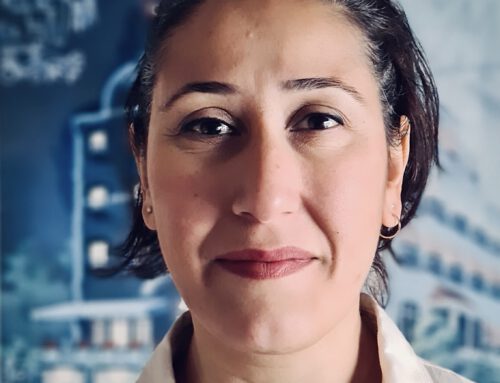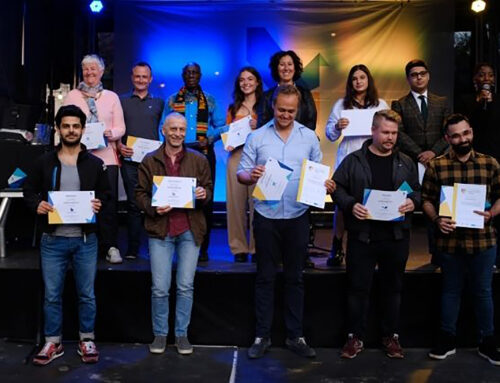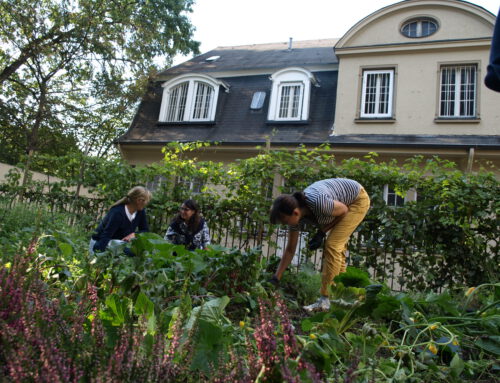This interview has conducted and published by engels-Kultur.Kino.Wuppertal on 27 April 2022. This page presents the English translation of the interview. Check the original page.
We are not specifically concerned with a political assessment of the Ukraine war. But peace work in particular is understood to be fundamental and permanent, isn’t it? Are there a few principles of your peace work in general?
The term “peace work” makes it clear that peace is a work and a way. It is not just a matter of talking or believing. Historically, the term “peacebuilding” or the work needed to build and maintain peace was first introduced by Johan Galtung in 1975. I am one of his students and studied peace and conflict studies at Hacettepe University in Istanbul while working as a freelance journalist. John Paul Lederach later expanded the term to a “comprehensive concept encompassing the full range of processes, approaches and stages required to transform conflict into more sustainable, peaceful relationships and to establish and sustain them”. Peacebuilding precedes and follows formal peace agreements, but is not a phase or condition, but a dynamic continuum of socially constructed change. Laying the foundations for peacebuilding means that “we are not just interested in ‘ending’ something that is not wanted. We focus on building relationships that collectively form new patterns, processes and structures. In my work, I have started to transform peacebuilding into an urban transformation process with its new meaning. Because in today’s world we need new methods to transform conflicts and in the scientific transformation literature in Europe at the time I arrived there was hardly any connection between science and the real world and I would like to add here that science has often become a tool for elitist approaches. I have been doing conflict analysis that has led me to new ideas and scientific solutions for equitable and sustainable urban transformation at the micro level. While I write, think or speak, I work for peace.
Are there any institutions in Wuppertal that you have set up for peace in the long term? Places, groups or otherwise.
Unfortunately not. Because there is no corresponding department in the university and I could not find a place for myself directly in other institutions either. But I wasted no time and did a scientific peace project as a doctoral thesis. In my education, the professors kept telling me that I should be the change where I live. I wanted to start a family and followed my love and moved to Wuppertal. Many idealists prefer to stay alone or opt for individualism. But in my culture, the family is the core of all structures. If I want to be a change agent, I should not ignore my feelings. I have combined my peace work and my family life in Wuppertal, but the next step will change my life again. When my professors told me that it is not easy to be a peace worker and that you have to work a lot on yourself and change, e.g. be persistent, don’t give up or don’t realise peace, I could not imagine that it would be so hard. But I am grateful to my family who support me. But there is a criticism that is at the same time a peace work from my side. Resources are not evenly distributed in the system and decision-making processes are not inclusive. The prevailing structures hinder new ideas because there is a lack of trust. I have done some experimental fundraising and found that there is a lot of conflict between groups and even corruption when groups want to get resources.
I have heard about the Peace Garden. Does it mainly have a symbolic function?
Yes, as volunteers and peace thinkers we have built a peace garden in Wuppertal, a nature-based peace project that started in February 2020. This “Avantgardenist” project is a prime example of a diverse community taking responsibility in its urban environment. An Avantgardenist approach is a new method of working in nature to build an agro-ecological relationship between plants, people and animals – especially between women and nature. It is an experimental, radical or transformative method that relates to art, culture and society. It takes responsibility in its urban environment. It brings together thinkers and volunteers who want to participate in the collective search for ways towards a sustainable, just and solidary world. The Peace Garden invites different cultures and actors to build a peaceful relationship with each other while re-establishing a “dialogue” with nature. The vision of this scientific project is to create a new model of conflict transformation while enabling intercultural exchange processes. The Urban Gardening Peace Project at the Alevi Cultural Centre in Wuppertal was implemented as a symbol of the virtue of justice and sustainable transformation. In this process, peacebuilding helps to prevent violence as it works with inclusive strategies to promote mutual understanding in three ways: First, it supports inclusive processes of just transition, and teaches to respect diversity of cultural background and ethnicity. Second, it promotes “greener” and sustainable behaviours and attitudes among participants. Third, it teaches new meanings of collective struggle for a common future in different languages, cultures and sacred places.
And what exactly is the Wuppertal Peace Forum all about?
It is a peace initiative at the local level that comes from people with different backgrounds and speaks one language against racism, discrimination, exclusion and all forms of violence. This forum organises non-violent activism to raise awareness and invites all parties to work for peace. There is only one thing I need to mention here. The group needs more diverse voices from different countries. For me, peace work is much more effective when the participants are heterogeneous. But the local language is not easy, so it is not easy to integrate activists.
You also participate in international conferences as an expert. What is your role there? What has it been about so far?
I analyse the problems and look for solutions. We need new methods to create dialogue. When we started with the idea of the Peace Garden, for the first time many politicians, activists and environmentalists visited this place and came into contact with a community and shared their knowledge. This was a very good start for building trust, because although we live in a diverse city, we live in parallel worlds. For this reason, I was invited to several conferences, congresses or institutional discussions. In my academic and practical approaches, I advocate for the creation of new social structures and the implementation of modern scientific solutions. After all these interventions, I wrote an article for the Georg Arnhold Institute, became a fellow of the UrbanA project funded by the EU Parliament, a collaboration with several universities and institutions across Europe for a sustainable and just future, and finally this year I was invited to the G7 Scientific Committee to write a policy paper for the new methods of peacebuilding. Germany holds the presidency this year and urban transformation will be one of the most important topics going forward.
Does peace work necessarily mean being a pacifist? In the sense of: Renouncing violence without exception?
I also call it non-violent thinking. I would like to add a quote from the pacifist anarchist Ammon Hennacy: “You cannot be a vegetarian between meals and you cannot be a pacifist between wars.”
What do you reply to people who say: “Current wars prove, after all, that peace policy does not work without a military component”?
Many of our behaviours and attitudes are at odds with each other and trigger negative outcomes associated with fear. This triggers violence. In the early days of the first wave of Corona, we gave a presentation on ways to create a peace garden in urban spaces. In preparing that presentation, I became aware of an irritating fact. The investment in arms over the last three decades has been made in just a few months. Rationality does not mean that we find solutions to more conflicts. We have started investing more out of fear. More castles, walls, borders.And these weapons were not bought or made to be displayed in museums. You can see the statistics in the presentation. We have to unite for humanity and nature. We have no other choice.
Finally, though, about Ukraine: Personally, I was rather irritated by Chancellor Scholz’s almost enthusiastic yes to the billion-euro arms package. Is the money perhaps needed elsewhere? And hasn’t a spiral of armament always been dangerous? Or is armament in the Ukraine war perhaps “exceptionally” necessary to keep Russia from further expansion?
In 2020, during the second wave of the corona pandemic, I wrote an article for the newspaper “The Sand” about new forms of dialogue. In one section of this dialogue proposal, a problem was raised, namely the lack of participation of different actors who can be part of the change in the city. Without regard to our ideological compartmentalisation, we need to find a way to live, talk, understand and respect each other. These are the basic needs of our society and our world. This war did not happen in one night. There are many causes in the region, yes, but Corona was the catalyst because we all broke our relationships, even with our neighbours. Many experts and academics have been working on this delicate conflict over the last few years. But if we insist on dominating and allowing those in power to make decisions about the future of the world without consulting others, we must change ourselves, our structures and our governance to prevent violence. Many generations will feel the effects of such a lack, as urban transformation cannot take place if only one particular group decides and other groups are excluded from the process. A group that feels excluded is more inclined to resort to violence in different ways. Regarding militarism: We cannot build peace unless we invest in education, art and science. There can be no sustainable development without peace and no peace without sustainable development.
Is peace and its preservation then above all a kind of precondition for the fight for climate to succeed? Is peace then not so much an end, but a means? I had understood the essay roughly as follows: The climate change must be based on the participation of marginalised groups, otherwise it will not have the necessary acceptance and will not work.
Is peace work then a method for a more peaceful world at all? But I think I can almost answer that myself: it goes both ways, doesn’t it? That’s what your formulation sounds like: “There can be no sustainable development without peace and no peace without sustainable development.
To address climate change, peace science can contribute as an interdisciplinary and transdisciplinary approach that helps us find solutions. I am working on implementing peace science appropriately in the real world in an urban context. We can use sustainability and just transformation processes to create “new methods of dialogue” in an urban setting. Especially to give vulnerable, marginalised groups a space that respects their identity and can be a catalyst for progress. We need to build resilient communities and cities. This could be an opportunity and a moment to heal our traumas and invite all parties to radical change.
In ancient times, wars may have taken place in the fields, but in recent years we have witnessed wars in the cities. In this regard, creating positive peace in cities can help us secure our common future. We need social innovations that start at the micro level without investing in the prevailing structures. We should look at the meaning of peace from a different angle and start to think outside the box and implement solutions.



